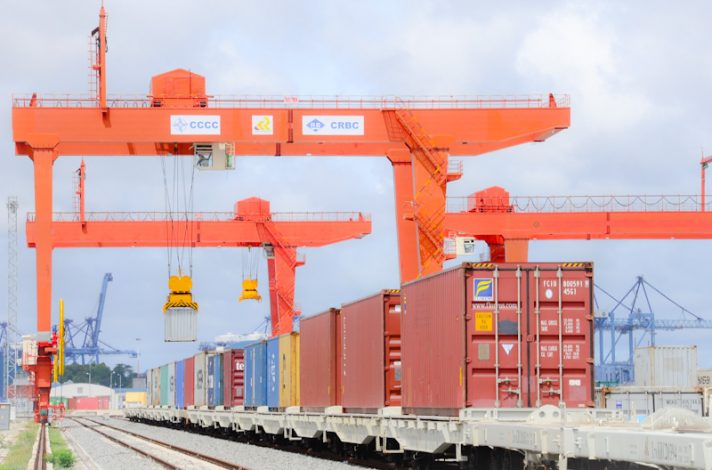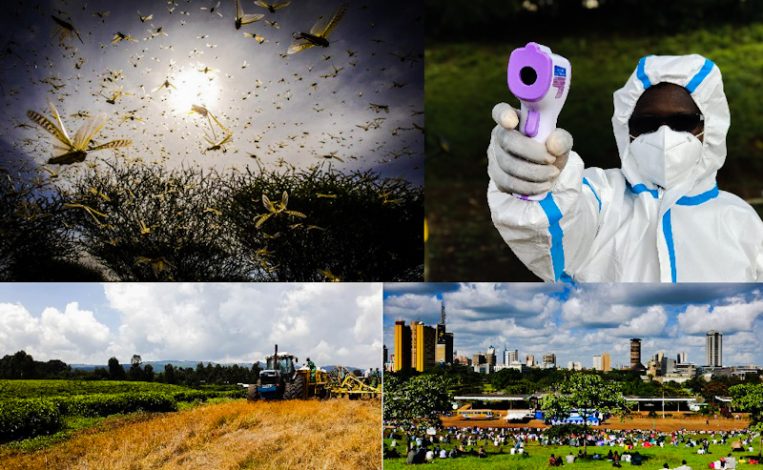The COVID-19 pandemic left Kenya battered and anguished in 2020 but containment and mitigation measures put in place to curb the spread of the virus helped to mitigate its impact.
On February 11, the World Health Organization named the new disease as Covid-19.
The first case of COVID-19 in Kenya was reported on March 13 when a 27-year-old lady, who had travelled from Ohio, Chicago, London en route to Kenya on March 5.
On March 26, the country reported its first death, a 66-year-old man. He was also diabetic. He had arrived in Kenya on March 13 from South Africa via Swaziland.
May 20, Kenya’s confirmed coronavirus cases crossed the 1,000 mark. By the end of the year, the country had registered 96,458 confirmed positive cases with 1,046,667 cumulative tests having been done. Total recoveries stood at 78,737 and cumulative fatalities at 1,670.
In April, cessation of movement by road, rail or air in and out of the Nairobi Metropolitan Area; and the counties of Kilifi, Kwale and Mombasa was initiated. This was coupled with a daily nationwide curfew from 7:00 P.M. to 5:00 A.M.
Then, Nairobi, Mombasa, Kilifi and Kwale counties had been identified as high-risk counties affected by the Covid-19 pandemic, according to Kenya’s Ministry of health.
Fortunately, cessation of movement in Kwale and Kilifi counties and movement into and out of Eastleigh and Old Town was lifted from 4 am on June 7, 2020.
“For us to revive the economy, reopen and remain open, the government and all citizens must pull together,” said President Uhuru Kenyatta in a televised 9th Presidential address on the Coronavirus pandemic at Harambee House.
READ

Economic Impact
The impact had already been felt as streets became deserted in COVID-induced lockdown.
Indeed, the novel coronavirus paralysed the economy, devastated communities and confined millions of people to their homes.
Schools and colleges shut with the Ministry of Education declaring that its 2020 school calender was considered lost.
Shops, clubs, bars and restaurants closed.
Those who could work from home, Zoom, Google Hangout, Microsoft Meet, Skype calls replaced meetings, business travel and parties. Those whose jobs were not transferrable were often sacked or forced to risk their health and work regardless.
Kenya’s private sector activity declined sharply in April owing to the impact of the coronavirus resulting in falling demand, input shortages, and lockdown restrictions. The Markit Stanbic Bank Kenya Purchasing Managers’ Index (PMI) showed a reading of 34.8 in April from 37.5 in March. This was the fourth successive month signaling a severe decline in overall business conditions.
Chronic underinvestment in healthcare was brutally exposed, as hospitals struggled to cope and intensive care units were rapidly overwhelmed.
Underpaid and overworked health workforce battled without personal protective equipment.
Kenya’s tourism and hospitality industry had been adversely affected by the coronavirus outbreak, including hotels and airlines.
At the beginning of the year, the hospitality sector was projected to increase with the number of international arrivals growing by an annual appreciation of 6.7% to approximately 2.3 million in 2020, resulting in a greater demand for hospitality services.
Kenya Tourism Federation (KTF) in March disclosed that 98 per cent of international tourists had left the country and it would have an extreme ripple effect on the entire chain-food supplies to hotels with a massive loss.
Consequently, the first half of the year the economy contracted by 0.4% due to the 5.7% contraction in Q2’2020 down from a growth of 5.3% recorded in a similar period in 2019.
Market analysts said the contraction was largely driven by the 83.3% decline in the accommodation and food sector following the closure of most facilities and also the reduction in tourist arrivals into the country.
“This is the first contraction since the third quarter of 2001 when the country recorded a 2.5% contraction,” Cytonn Investments had said.
Inequalities
In addition, the World Bank estimated 2 million citizens had been pushed into poverty.
“Kenya’s poor population was predominantly rural and less well education pre- Covid-19. However, the shock of Covid-19 created a new group of ‘newly’ poor Kenyans with demographic characteristics,” said the World Bank.
According to the World Bank, COVID-19 not only has affected physical health, but mental health as well, resulting in psychosis, anxiety, trauma, suicidal thoughts, and panic attacks.
“These feelings have a negative impact on the economy through a reduction in socializing, recreational spending, and aggregate demand.”
The unemployment rate increased from 5 per cent in the last quarter of 2019 to 21 per cent at the beginning of June 2020.
This was being witnessed besides the introduction of measures to offer relief and increase disposable income to citizens such as tax breaks, employment support, and loan deferment to cushion them against the impact of coronavirus.
“The fundamental concerns and anxieties center on the health impact, job losses, and duration of the crisis. The ongoing interventions by the Government are aimed at containing the pandemic and moderating the economic and social impact,” Dr Patrick Njoroge, Chair of the MPC said in March.
Optimism
As 2020 wound down, the country and the rest of the world welcomed news of a vaccine.
“The positive vaccine progress coupled with the recent decline in the Covid positivity rate to below 5.0% has reduced the risk of further mobility restrictions. Indeed,
with the reopening of schools, the next one month will be crucial in determining the pace of contagion going forward, although the probability of secondary closures remains minimal,” NCBA Market Analysts noted in their December Economic Report.
“The speed at which the Vaccines shall reach the country and how fast they shall be distributed shall determine how fast the economy can get back to normalcy. A resurgence of the Corona Virus cases could lead to further measures not supportive of growth,” Cytonn Investments says in its 2021 Markets Outlook.






4 Comments
Pingback: Covid-19: Falling Incomes in Q1 2021 Leave Kenyans Very Worried
Pingback: Sidian Bank Receives KSh500 million Funding for SME Support
Pingback: Kenya’s Sh10 Bn Covid-19 Cash Transfer Program Lacked Oversight -HRW
Pingback: Why Do You Need LG For Your Sport?